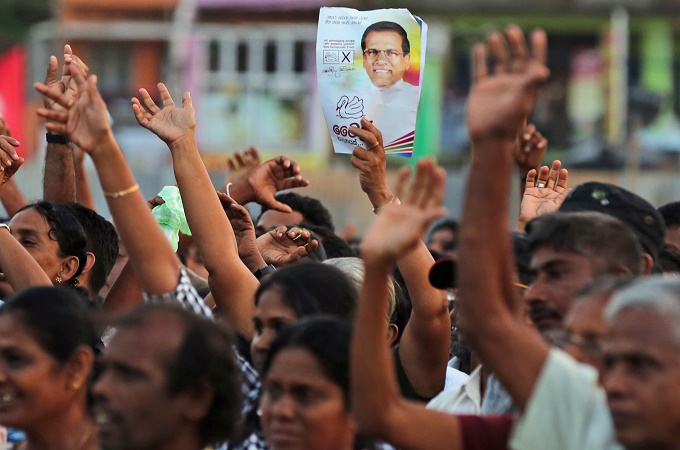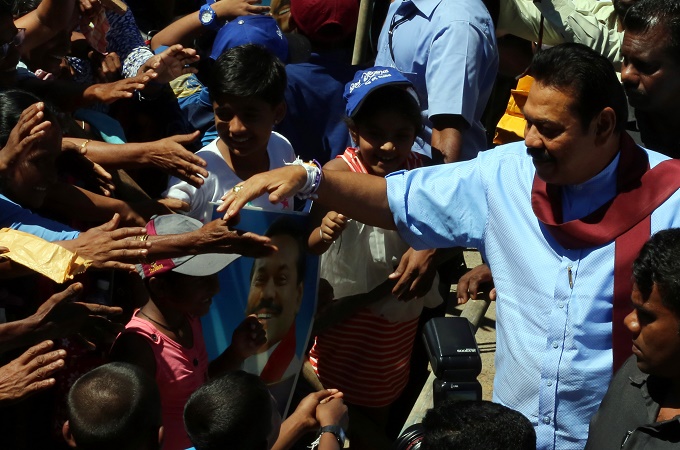Challenging Sri Lanka’s ‘war’ president
Brazen election bid by prominent defector may not end in victory, but it has shaken the nation’s political foundation.

Colombo, Sri Lanka – Maithripala Sirisena – Sri Lanka’s former health minister who defected to the political opposition – oozes confidence as he identifies himself as the South Asian island’s next president.
A candidate who took the country – and President Mahinda Rajapaksa – by surprise, Sirisena poses the biggest challenge yet to the 10-year rule by the civil war-winning incumbent.
“People desire a change. But it is not a change for the sake of change but a qualitative change?” Sirisena told Al Jazeera. “There are many unaddressed issues and my future mandate is to address those issues.”
These unaddressed issues, according to Sirisena, are largely linked to governance concerns. “A war victory and road development cannot be the only reason for re-election,” Sirisena said.
Leading a diverse group of political parties opposed to Rajapaksa’s stringent rule, Sirisena promised to make his administration a complete contrast to the incumbency.
The Rajapaksa government, he opined, is similar to a family business, replete with large-scale corruption, crony practises, and economic mismanagement.
 |
| Supporters of Maithripala Sirisena rally [EPA] |
Mass defections
Rajapaksa campaigners, meanwhile, have openly condemned their former health minister as a “village bumpkin” with no political foresight or ability. He’s also been branded a “traitor” for turning on the main Sri Lanka Freedom Party, of which he was a member since age 17.
Sirisena’s election campaign gathered momentum with more than two dozen defections to the opposition by leading government politicians and two parties – the ultra-nationalist Jathika Hela Urumaya and Sri Lanka Muslim Congress.
The ruling coalition mounted criticism on Sirisena, alleging his election would result in the granting of a separate state for the ethnic Tamil minority in north.
Sri Lanka’s ethnic Sinhalese-dominated government fought a bitter decades-long war against the Liberation Tigers of Tamil Eelam rebels, which ended in 2009. More than 100,000 people were estimated killed in the civil war, including 40,000 mostly Tamil civilians in its controversial final months.
At a media briefing in the capital on January 3, Sirisena rejected the charge about a separate Tamil state, saying he remained committed to safeguarding the unity of the country of 22 million people. He denied any secret deals of any kind with the Tamil National Alliance party or the Sri Lanka Muslim Congress.
“I will never compromise my country or its national security,” Sirisena pledged.
Campaign violence
Attacks on Sirisena’s campaign have not been confined to the verbal. Several opposition election meetings have been attacked by unidentified assailants.
Shots were fired at Sirisena loyalists setting up the venue ahead of a public rally held in southern Kahawatte town on Monday. The district’s magistrate has ordered the arrest of a ruling party parliamentarian in connection with the incident that wounded three people.
There is absolute venom in Sirisena's political decision. He has nothing positive to offer except hatred towards the president and his family.
Sirisena loyalists say the Rajapaksa administration has begun to smell political defeat, which has driven government supporters to unleash violence on the presidential challenger and his followers.
“The government’s hate-filled reaction itself is an admission of defeat,” said Harsha de Silva, an economist turned opposition politician who is a leading campaigner for Sirisena.
Analysts say many senior officials within Rajapaksa’s United Peoples’ Freedom Alliance (UPFA) had been unhappy with the president’s governing style for several years.
Allegations have flourished about Rajapaksa’s family being in control of both the economy and political administration.
Sirisena is considered the manifestation of the discontent and dissent that did not emerge until Rajapaksa’s announcement of the presidential election in November, two years ahead of schedule.
Different paths
Political observers say to his credit Sirisena has managed to bring together all shades of political opinion – at least temporarily – lending legitimacy and strength to his campaign.
The two election campaigns couldn’t have been more different.
Sirisena has pledged to rollback constitutional amendments implemented by Rajapaksa that gave the president near complete power over the country. He also said he would bring back the position of prime minister – which was abolished by Rajapaksa – and reinstate prominent opposition figure Ranil Wickremesinghe.
If elected, he also said parliamentary elections would be held over the next three months.
“We are target-oriented, we have goals to achieve within a 100-day period,” said Sirisena.
Rajapaksa’s campaign, meanwhile, has strongly relied on marketing the war victory in May 2009 over the Tamil Tiger rebels, economic growth, and infrastructure development achieved over the past decade.
Taken to task
 |
| President Mahinda Rajapaksa greets supporters [EPA] |
Despite increasing public support for the former Rajapaksa ally, Sirisena’s detractors have scoffed at his electoral pledges, saying he’s making lofty claims that lack political substance.
“There is absolute venom in Sirisena’s political decision. He has nothing positive to offer except hatred towards the president and his family,” Housing and Construction Minister Wimal Weerawansa said recently on national television.
One thing in common between the two candidates is a refusal of an international investigation into the final months of the 2009 civil war, which has brought allegations of war crimes against both sides.
Sirisena – who survived a Tamil Tiger suicide attack in 2008 in Colombo – said in December if elected he would order a domestic court probe into military operations that possibly killed tens-of-thousands of people in the war’s final stages. But Sirisena has resisted international intervention in the matter.
Rajapaksa has long been adamant that the United Nations call for an international investigation was unnecessary.
Irrespective of Thursday’s electoral outcome, Sirisena’s defection from the ruling coalition and entry into the opposition has altered the dynamics of Sri Lanka’s divided political landscape.